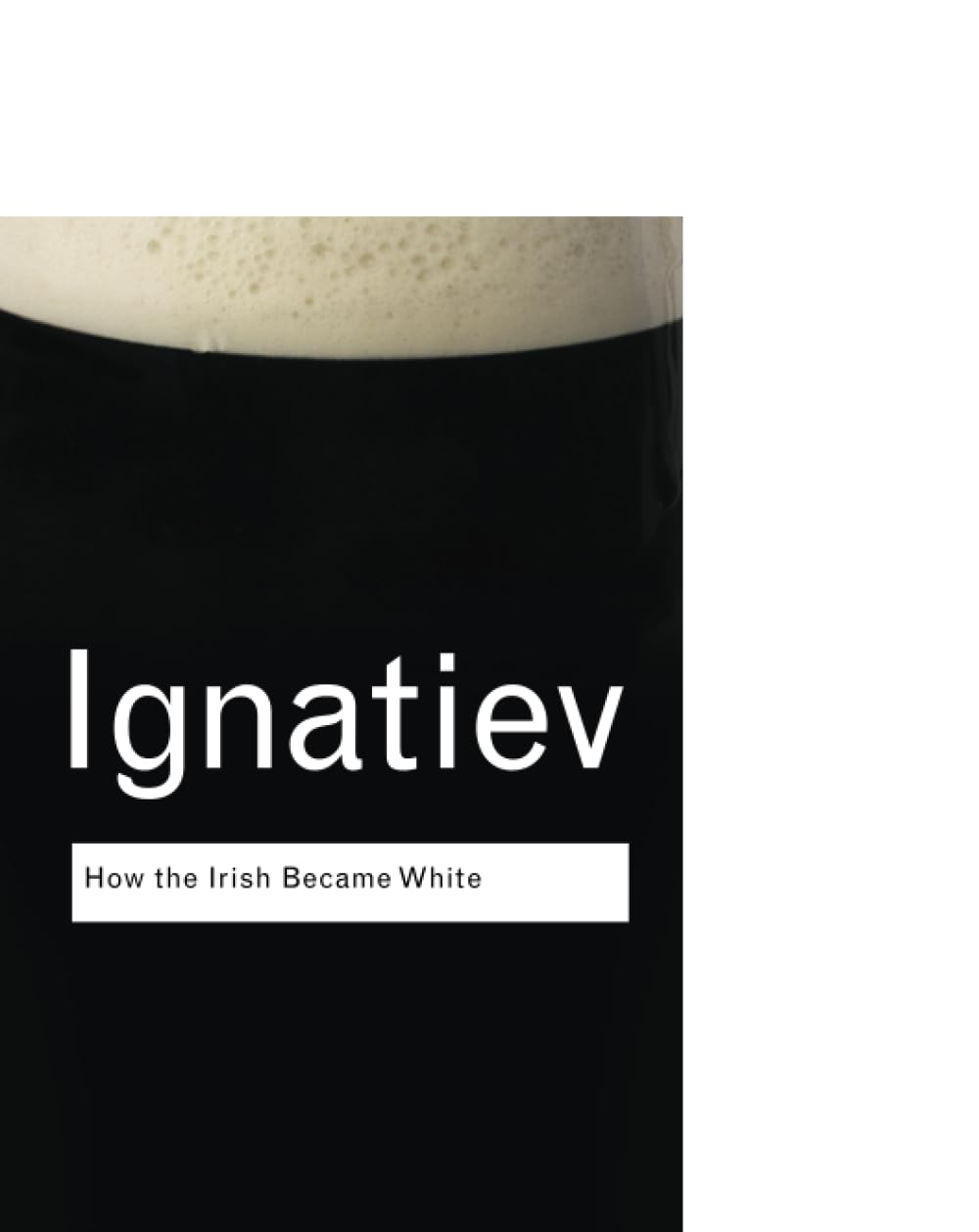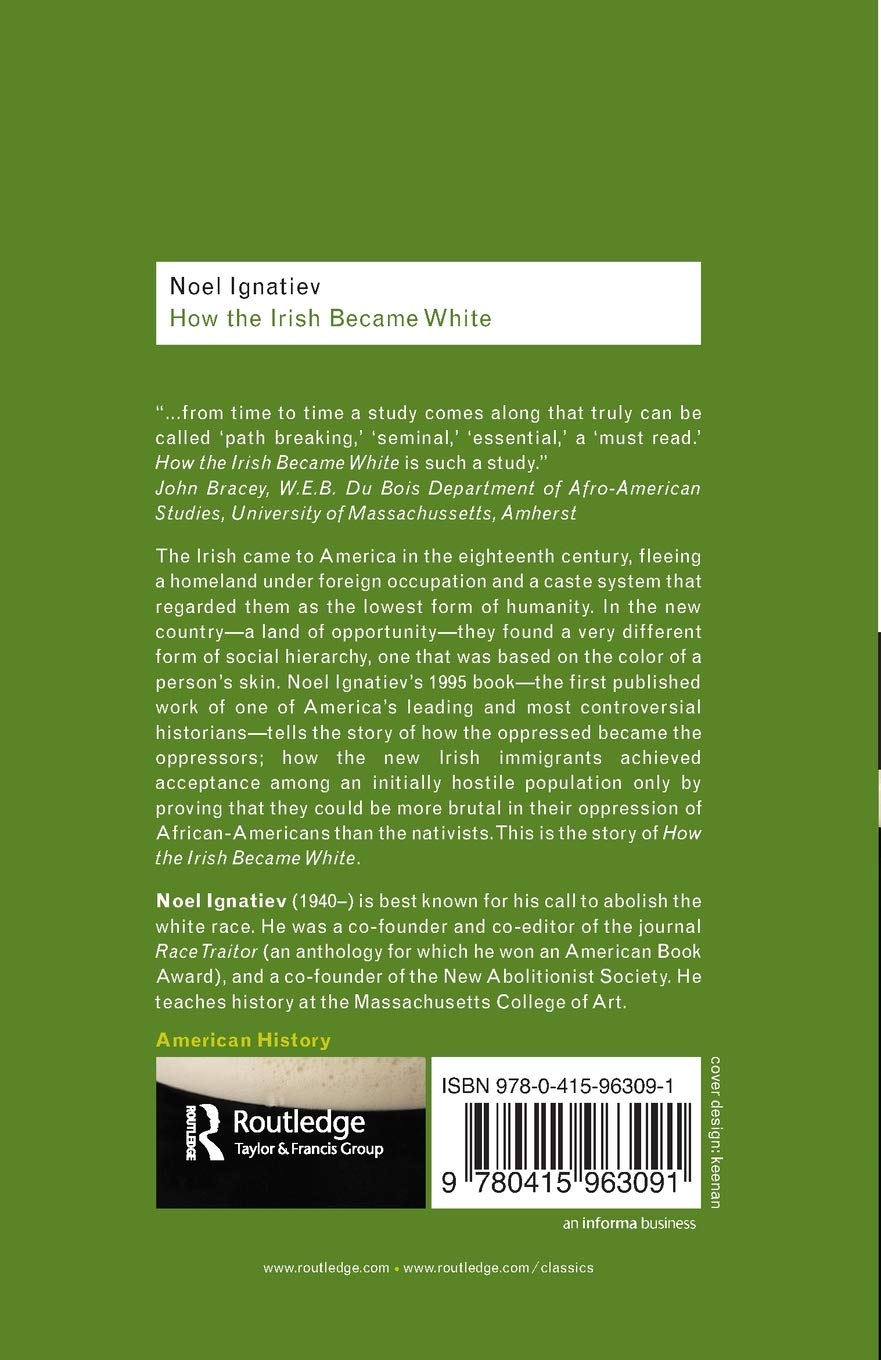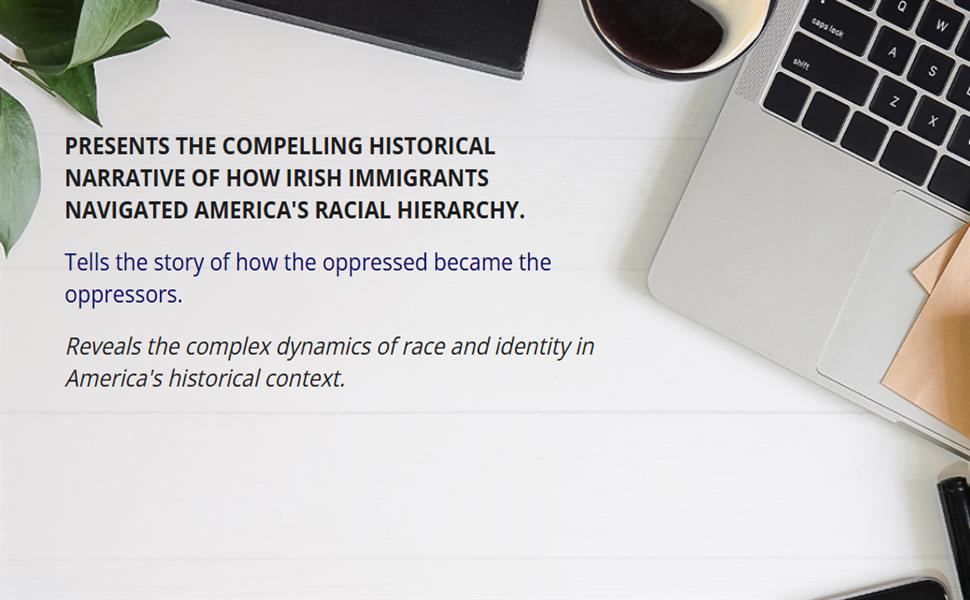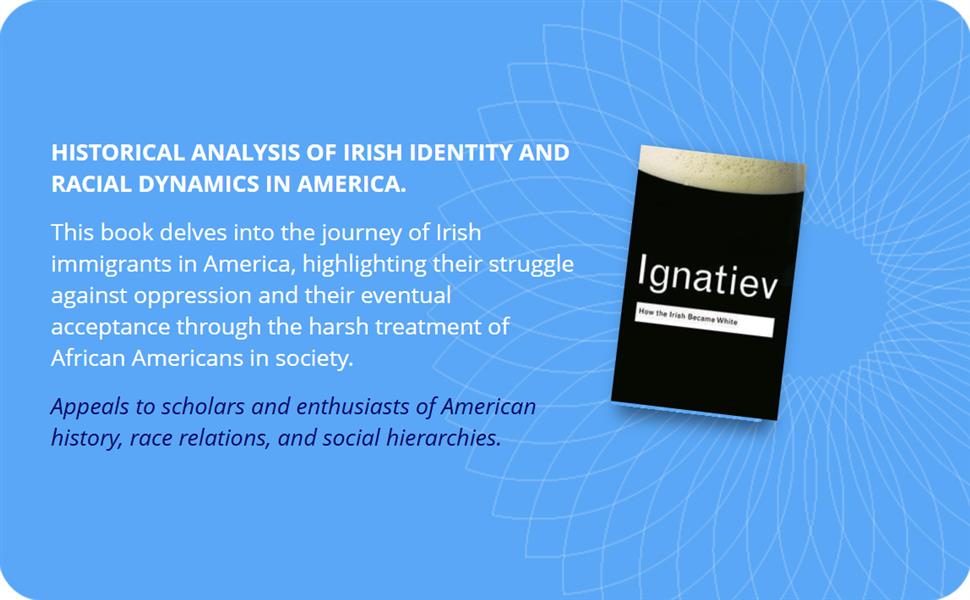



Full description not available




M**L
Exemplary history of race and class in America
One thing that infallibly determines the quality of a book is the idiocy of those inclined to negatively review its content. This book proves that rule with particular emphasis, as can be seen right here. Noel Ignatiev's book "How the Irish Became White" uses the methods of the new historians of labor in America, who acknowledge as must be done that race segmented class and became part of it, and that the unity of the working class in struggle against capital in America is a historical lie. To the best extent possible given the often scant material, he applies this methodology to the case of the Irish, in particular in Philadelphia.As Ignatiev shows, race is a social construct, and it was therefore at the time by no means 'obvious' that the Irish were white, as would be the case now according to these classifications. On the contrary, the Irish were especially from the time of the Irish Potato Famine (1845-1855) on desperately poor laborers, which at the time meant they were not likely to be seen as white. So the Irish had to become white, through struggle of their own. This was only possible by participating in the oppression of the class automatically put on the lowest rank of the urban ladder, the black workers. Whether slave or freeman, the Irish hated, despised, and persecuted them, and in the cauldron of this racial antagonism, the Irish working class was bleached white in the eyes of the ruling class.The usual arguments about the relations of race and class in America are shown to be fallacious. Black workers were not strikebreakers per se, but had to become strikebreakers because they were systematically excluded by the Irish unions. Whenever the black population organized itself and formed its independent spheres of power, the Irish attempted to destroy these. The Irish vigorously supported slavery and the Southern cause, only going so far as to reject secession, which would leave them on their own facing Northern capital. When the Civil War increasingly turned toward the cause of abolition, the Irish of New York City revolted in one of the 19th Century's greatest riots. No black worker was even permitted to work alongside an Irish one by the latter, or they would strike on the spot or leave their job.This is not because the Irish were or are inclined to evil or prejudice more than anyone else. It is precisely because the Irish were the most despised of all 'free' labor, and yet were exalted above the blacks. As Ignatiev showed, in late 18th Century Ireland itself, even very poor Protestant Irish considered themselves racially superior to the Catholic Irish. Their feelings of superiority were precisely all they had, and the British did all they could to encourage it, since division within a class greatly eased their occupation. The same phenomenon prevailed in America, only there unity was actually impossible, since the blacks had been brought to America involuntarily whereas all others were voluntary settlers. This incompatibility of viewpoint made the citizenship status of blacks dubious from the very start of the existence of the American Colonies, and as a result, the blacks were not opportunistically, but permanently consigned to the lowest rank within American labor (with Native Americans for the most part excluded from these ranks altogether). For any settler to prove himself 'white', it then became necessary to partake in and support this system.Not so therefore the popular social-democratic myth that capital managed to conspire to divide the workers, or confused them to their 'true' interests. Although they would have been better off united, the very foundations of the American state were laid on the basis of this racial division. As long as America was and remains founded upon it, original African-American workers as a racial class could and can never advance beyond the lowest rung of the ladder, nor could and can Hispanics or the original Asian immigrants. Conversely, no settler or his descendant could or can fall to that level unless they are willing to reject the mess of pottage called 'whiteness' for which they have exchanged their birthright of equality and solidarity among the working class. As Ignatiev shows, in the 19th Century, the number of such workers was very few indeed. Are there more now? Then let them show themselves.
M**E
Very interesting book.
The book was a very interesting read.
R**C
dry
this was a phd dissertation. it still is. this book is bound to inflame people who will view it from a political perspective, not a factual one. " my opinions do not require facts" in that case don't bother. otherwise slog your way through this to hear facts very seldom said or referred to in any context. guess i am a race traitor too.
A**R
Interesting opinion piece. Reads more like a legal brief.
I agreed with 90% of what he wrote but, despite an abundance of footnotes, he explains in the 2nd paragraph of the Afterward that "... I have aimed not so much at facsimilitude as plausibility: aware that no historical study can account exactly for the life of a single person, I have tried to tell the story as it might have happened, and I ask that it be judged for its coherence and explanatory power. If there is any value in what I have done, I believe it lies not so much in the answers I have come up with as in the questions I have posed." Two problems. First, I wished he had stated that in the Forward, not buried it in the Afterward. Second, that's fine request from a lawyer, who only has to present one side of a case; less than satisfactory for an amateur historian, especially one who's avowed position is that the white race should be abolished.
G**Y
Very scholarly but stopped too soon
A very scholarly treatise which explained lot about the Irish and abolitionist dynamic in pre-Civil war America. Gave me some real insight into the transition of the Irish from immigrant to racists which was a better place for them to be. Very sad how given the history of oppression in Ireland they were so ready to take their place along whites in exploring blacks to their economic advantage.However, I was disappointed that the story pretty much stopped at or even before the Civil War and didn't even get much into the role of thIrish in the Civil War. I think there was a lot more to be told.Not an easy read.
C**K
What you didn't learn in school
This is the history the didn't teach in school. This further proves that race is social construct. The white immigrants had to earn their whiteness and it was at the expense of Black Americans.
L**I
American History
This is a great read that really breaks down the relationship between American Descendants of Slavery and the Irish, while American History has tried to paint our trials and tribulations as being similar, the truth is that this book shows that that is untrue, the Irish were able to simulate into whiteness on the backs of black American's. You just have to read this book.
H**N
A must read
A must read for anyone brave enough to face and overcome their own bias and especially for people of Irish descent.
L**R
A really interesting thesis on the early struggles and thoughts of Irish Americans
This isn't a long book but has a lot to say in those 200 pages. There are huge amount of statements and quotes that make you think deeply about the integration of, not just Irish Americans, but also African Americans and other immigrants into a society that viewed them as sub-human.The book starts with some interesting background on Daniel O'Connell in particular, and how, although he was a big supporter of the abolition of slavery, ultimately he was more concerned with Home Role, and much of the financial support eminating from America was from slave landownders in the South. There is an interesting snippet of a letter from Engels to Marx where he labels O'Connell as a moneyed aristocrat and two faced Whig.There is statement that while the Irish could not rise to the level of white man in America, they refused to fall to the level of the black man. That is depsite the fact that they most often lived in the same accommodation as them in northern cities. Interestingly, the Irish came from farms but never moved westwards, most likely as they did not have the money. Instead they competed with black people for the lowest jobs in sociery in cities. They formed the early unions not only to improve workers rights, but really to secure the jobs for white Irish people and not for black people. That allowed the Irish to develop positions of power, as too did the later entrance of Irishmen into the police force but not blacks. From there the Irish were able to use their power to force their particular desires on the communities if needed. There are some interesting snippets that the fault lines were not always black or white, Irish or not, but in fact there was plenty of fighting between Munster men and Leinster men too, that the lines were still very parochial even in the US.Furthermore there was in fact plenty of mingling in pubs and society between black people and Irish people, who often shared the same bars and pubs. There are a huge amount of examples in the book of individual stories and people who intermingled.Of course slavery and politics are hugely important to the story. The Irish have - and do - vote unwaveringly for the Democratic party. Early on this was largely because they did not want slavery to end. Rather than this being born primarily out of a position of racism, it was more self preservation. The Irish feared that the end of slavery would release millions of slaves into the job market and lower their own value. It was an enormously selfish position but one which must be looked at in context. Everyone was scrapping for their own lives at this point in time.And furthermore it is not like the Irish lives had greater value. Quite often Irish were sent into the do the jobs which were do dangerous to risk slaves (like layinf railroad through a marsh). A slaveowner had paid big investments up front for slaves - they were not willing to risk them so easily. The death of an Irishman cost nothing. There are also some interesting arguments that some of those against slavery were against it rather for economic reasons. Adam Smith thought being a slave made a worker lazy as they did not have to work for their wage and were guaranteed bed and breakfast (a bit of an odd position but he was in the UK rather than South Carolina).At some points in the book it becomes a little repetitive with the stories but there are snippets of gold in here. A well worthwhile read.
P**E
Brilliant Book
As someone of Irish decent this was a very difficult book to read. Everyone wants to be on the good side of history and sometimes the truth is difficult to hear.From this masterpiece I learnt how Irish people were treated just as badly as black people, for being Celtic and not Anglo-Saxon. It seems like such a strange thing to consider in today’s times but it’s interesting to see, how Irish people were finally accepted. The book details how necessary it was for white Americans who considered themselves Anglo Saxons, to create a racial hierarchy, which included Irish people. To justify the enslavement and inhumane treatment of black people and slaves. As for a time Irish people and black people were treated just as poorly and even lived in the same underprivileged and unhygienic areas.We all talk about Irish slavery which existed but we never speak about how readily Irish people, were quick to throw their black friends and neighbours under the bus. To fit in with what it meant to be white. Even going so far as to treat black people worst to prove that they deserved their new place in society.And that’s the shame of it. The Irish people in America were happy to ill treat another group of people who had experienced the same things as them, to “fit in.”That was the most difficult to read.I hope that with important works like this, we can all break down “white supremacy.” And learn that we all the same race, and need to respect and honour each other. We are all one species and we will never evolve if we can’t get past skin colour. But in order to do that we must understand the past, to heal our present, to create a better future.Burying ones head in the sand and pretending like Irish people didn’t participate in the barbaric treatment of black people, doesn’t help anyone.
H**R
An important and interesting book on the Irish in America
I am still in the fairly early stages of reading this book, but so far I'm finding it very interesting; and I believe it's an important perspective on the Irish in America, on the anti-slavery movement, and on the Irish role. That the Irish were so numerous and influential by 1840 is revealing in itself. The work of Daniel O'Connell, and his shifting stance on abolitionism, is of great interest to me. I'm certain that in the rest of the book I'll find a great deal more of interest.My reason for a 4-star rating is that in places I find some sentences a bit difficult to follow, and some references to people without clear enough explanations as to who they were, and maybe the odd typo/mistake. However, this shouldn't take away from the importance of the book, and for anyone interested in the Irish in America - or in the abolitionist movement in America - I recommend it.
J**Y
Inelegant bu interesting writing.
The subject really interesting but its somewhat stodgy style has prevented me from finishing the book. That said, I will get back to it as its subject is too important to ignore.
R**0
Good Quality Print
Good quality print, the book itself is a bit less approachable than I imagined but good book
Trustpilot
2 weeks ago
3 weeks ago